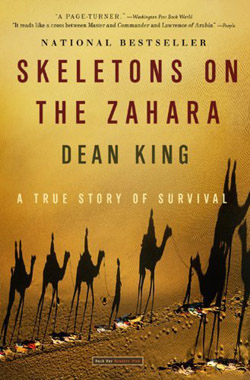When their ship wrecked on the western African coast in 1815, the 12 men of the American merchant vessel Commerce found themselves in a desperate situation. With no food, no water, and no hope of rescue, they were soon taken as slaves by nomadic Arab tribes and cast into the bleak and inhospitable desert.
For two months, they suffered from the searing desert heat, faced starvation, nearly died of thirst and were abused and beaten by their captors. By the end of their captivity, Captain James Riley had dwindled from 240 pounds to a scant 90 pounds. Some of his shipmates weighed even less.
This is the story of “Skeletons of the Zahara,” a fascinating and dramatic book by Dean King that had me eagerly turning pages to reach the end. The subtitle of this book is “A True Story of Survival,” and that it is. But what makes it make deeper is how it takes us inside the strange world of desert Muslim tribes into which the sailors had entered.
The Commerce wrecked on the shore of what is today Western Sahara, an arid landscape that even today remains sparsely populated and little explored. The men were stripped of their clothes, taken by different clans and split up. They had to scrap for food and battled severe thirst by drinking their own urine and camel urine. The nomads lived mostly on camel milk.
The Americans puzzled over the strange wanderings of their captors, which seemed rarely to bring them any closer to food or water. On the rare days when it rained, custom forbid the nomads from collecting in bowls or containers – they could only mop up what was left afterward. And when the nomads did find food or water, they seemed to squander it in a hurry it by sharing it with all-comers. “Tomorrow did not seem to exist for them until it arrived,” writes King.
Riley eventually convinced a trader named Sidi Hamet to buy him and four of his crew members and undertake an arduous trek across the desert to ransom his men to a “friend” the captain claimed to have in the Moroccan city of Swearah. Riley had no such friend – his move was a desperate gamble.
If this was a movie, the focus would be on the relationship that develops between Hamet and Riley, master and slave, captor and captee. Riley wins Hamet’s respect through his commitment to saving the lives of his men, while Riley admires Hamet’s ability to find a tiny sources of water amid a vast desert and to negotiate the hazardous and byzantine conflicts they face in encounters with other tribesmen. And all the time they are building trust in each other, Riley fears that his deception will soon cost him his life.
As the sailors near possible freedom through ransom, Hamet says to Riley, “I have fought for you, have suffered hunger, thirst and fatigue to restore you to your family, for I believe Allah is with you. I have paid all my money on your word alone. … If your friend will fulfill your engagements and pay the money for you and your men, you shall be free; if not, you must die for having deceived me.” Cue the dramatic music.
I have read my share of survival stories and would rank the sufferings of the Commerce’s men alongside that of Ernest Shackleton’s snake-bit Antarctic expedition and Louis Zamperini’s near-death in Japanese POW camps (“Unbroken” by Laura Hillenbrand). If you enjoy this sort of book, you will also like Nathaniel Philbrick’s “The Heart of the Sea,” the story of whalers set into desperate circumstances when their boat sinks.
-------
(Please support this blog by clicking on an ad.)
-------
(Please support this blog by clicking on an ad.)

No comments:
Post a Comment